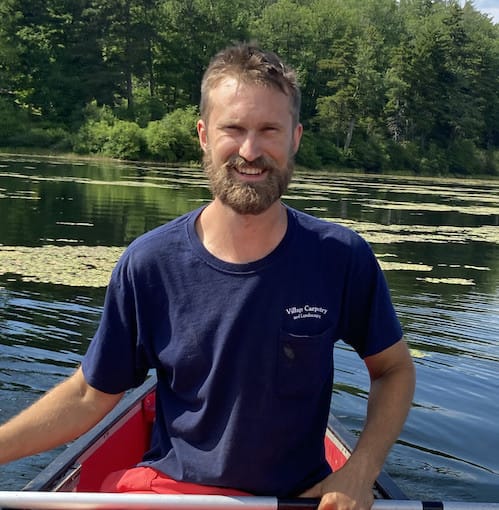The Rural We: Shelby Howland
The carpenter and landscaper will show you how to use and care for your scythe during a workshop in Williamstown next Saturday.

The carpenter and landscaper will show you how to use and care for your scythe during a workshop in Williamstown next Saturday.

Shelby Howland
Farmer, arborist, carpenter and landscaper Shelby Howland grew up in Plainfield and Shelburne Falls, and now lives in Goshen, Massachusetts. Working on small farms in these hill towns introduced him to hand tools as a way to “mow what you want and leave the rest.” He started Howland Tools about a decade ago to import European-made scythes, axes, shovels, and other items that are meant to last a lifetime. His father now runs the company, and the pair will show you how to use and care for your scythe on Saturday, July 16 from 9 a.m.–12 p.m., at Sheep Hill in Williamstown. The workshop is part of Williamstown Rural Lands’ Working Lands/Working Hands series.
Using hand tools is part of the practice of horticulturalism: working with plants instead of trying to control plants. (Weeds are just plants that aren’t where you want them to be. We eat the weeds that other people are trying to kill — they’re perfectly good salad greens!) The practice includes transplanting perennials to places where you want them to be and managing the forest system so it produces the way you want it to, such as burning the forest so you get oaks with acorns instead of beech trees. It’s more about sustainability than production.
Hand tools are cheaper than machines, and they don’t pollute. And if you have a complex landscape covered in trees and bushes because you want to eat the fruits of your land, that encourages the use of environmentally conscious land management methods.
Most [American-made] tools are good enough, but they don’t hold edges, and the steel quality might be poor. A shovel you buy at a hardware store is fine — it’s good for being mediocre at lots of things, but it’s not great at any of them.
Bringing in older style tools is bringing in a tangible memory bank from the people whose livelihoods depended on them. A short scythe is good for brush, medium for trimming, a field blade for hay mowing. A hand tool has a job, and you have to think about how the tool wants to work and then use it efficiently by using it for its intended purpose. If you’re a farmer or a homesteader, you want to work the least amount of time with the least amount of effort, so you can get on to other things, like milking the cows.
You want the tools to make your life easier so your body can last. You want them to be lightweight and strong, and work well so it doesn’t wear you out. A good example of this is wooden versus fiberglass handles. People like fiberglass handles because they don’t break, but they ruin your hands since there’s no shock absorption like there is with wood.
While this type of small-scale farm work has been revived and maintained in England, the mindset of those who first settled in North America was, “Who cares about land, there’s land next door.” So they depleted the soil and just moved on. In Europe, they’ve been farming for thousands of years and learned how to adopt more sustainable, regenerative farming practices. North Americans used the industrial “burn it down” mindset from the get-go, so it’s hard to reestablish the sustainable mindset, because there’s no economic viability when you’re competing with big industrial farms. In Europe, they’re not competing with them economically; they do it for themselves, because modern farming practices will not allow people to survive [in the long run].
The scything workshop is for anyone, whether you’ve already been using one or not. We’ll get into maintenance, use and care of the tools, and new site preparation, as well as getting “into the weeds” of advanced considerations of edge profile.